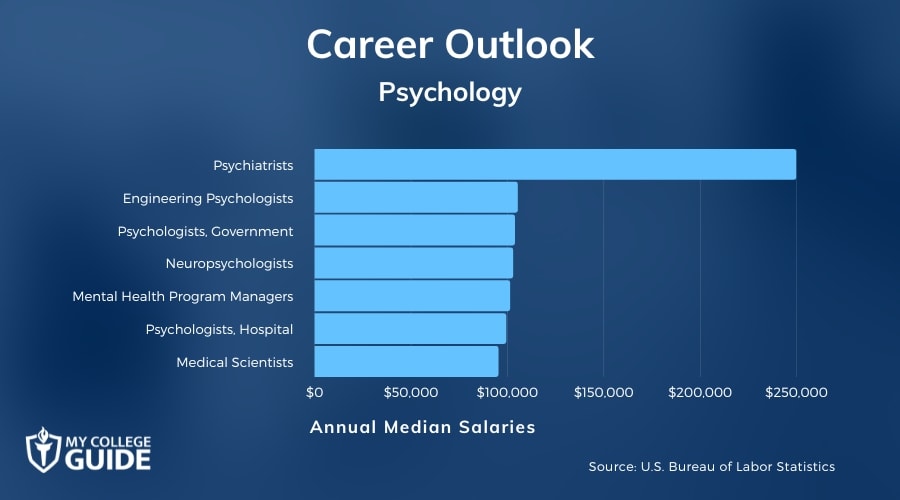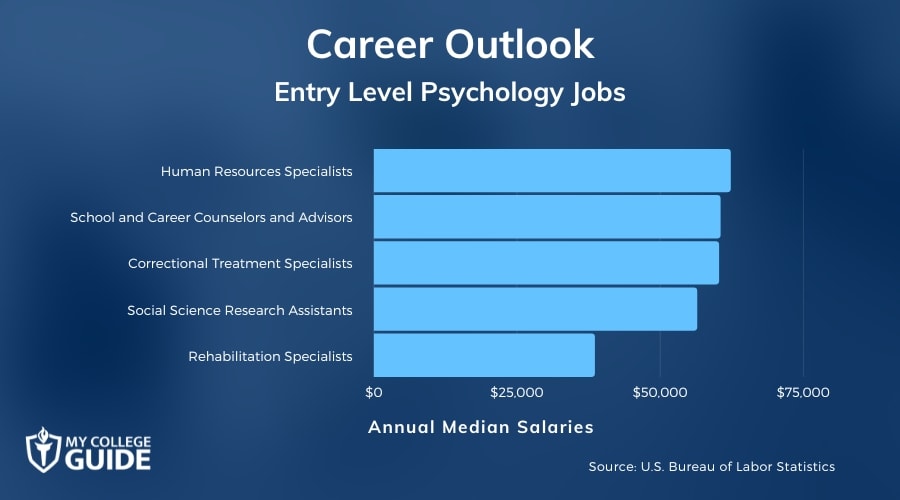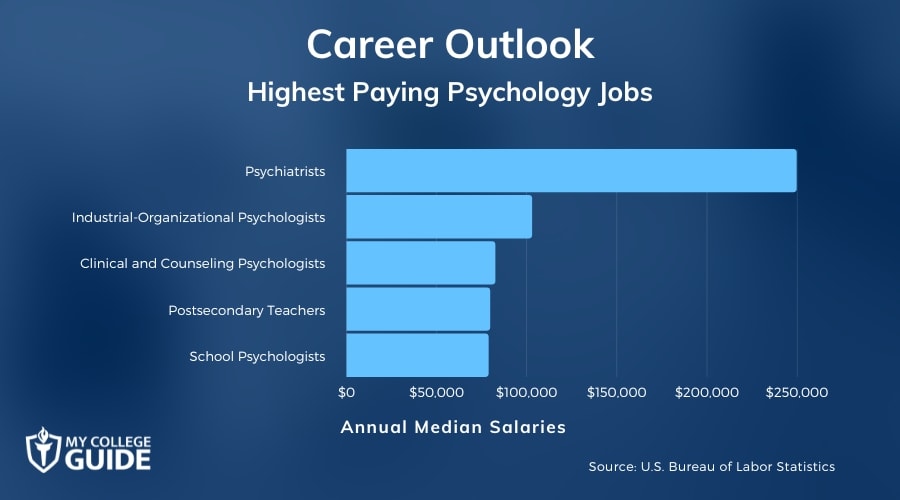Considering and researching psychology careers may be a good fit for you if you have a passion for helping people. Would you like to turn that skill into what could potentially be a six-figure career?

Psychology careers allow you to use your education, desire to help others, and overall communication skills and catapult it into a successful career.
Editorial Listing ShortCode:
Pursuing a degree in the expansive field of psychology could be the perfect path to lead you into the career of your dreams.
What Can You Do With a Psychology Degree?

The career choices available in the area of psychology are extremely diverse. By choosing courses throughout your psychology education that apply to your future goals, the skill set that you develop can give you a jump start in careers that range from corporate business to the medical field.
You can choose to work directly with patients’ mental health as a psychologist or work with young students in a school setting as a school counselor. Perhaps you want to help others overcome addiction battles as an addiction counselor. There are many options to help people one-on-one.
Editorial Listing ShortCode:
If you prefer a behind-the-scenes approach, you can use your physiology degree to conduct research on behavior patterns, market research, and more.
Fields of Psychology

Psychology is a diverse discipline, so you can choose to specialize in a range of fascinating fields, such as:
- Addiction & Recovery: Addiction counselors offer therapy and treatment for clients recovering from chemical drug dependency and non-drug addictions. They teach individuals about the causes of addiction and help them develop healthy habits.
- Behavioral Psychology: Experts in this field help individuals with behavioral and mental health disorders make appropriate choices. They can use methods like classical and operant conditioning to alter behavior.
- Business & Organizational Psychology: These specialists use psychological methods and theories to help organizations and employees function effectively. They help foster a healthy work environment, improve performance, and resolve conflicts.
- Child & Adolescent Psychology: These psychologists work with children and adolescents who have emotional and mental disorders. They study, diagnose, and treat young patients in schools, private clinics, and other settings.
- Counseling & Therapy: These experts provide individual, group, or family counseling for people with mental health disorders. They help clients improve their mental health and develop coping strategies.
- Healthcare: Health psychologists study the impact of physical disorders on emotional and mental health. They typically work in healthcare facilities and teach patients strategies to manage disabilities and illnesses.
- Teaching & Education: These specialists often work in educational settings as guidance counselors and school psychologists. They help young people, parents, and teachers meet goals and cope with behavioral and mental health challenges.
Many programs offer concentrations to help prepare you for a career in your preferred field.
10 Things You Can Do with a Degree in Psychology
You can pursue dozens of satisfying careers with a psychology degree. According to the U.S. Bureau of Labor Statistics, here are 10 popular psychology paths and their projected job growth over the next decade.
1. Psychologists

Education Requirement: Doctorate in psychology and licensing
Projected Job Growth: 6%
Psychologists study cognitive, emotional, and mental disorders and processes. Clinical psychologists typically diagnose and treat patients in healthcare facilities and private practices. Psychologists may also conduct research and publish findings.
2. School and Career Counselors and Advisors

Education Requirement: Master’s degree
Projected Job Growth: 10%
School counselors help elementary, middle, or high school students succeed academically and socially. Career counselors help college students and working professionals develop and achieve professional goals.
3. Market Research Analysts

Education Requirement: Bachelor’s degree
Projected Job Growth: 19%
Market research analysts study consumer psychology to help businesses develop more marketable products and services. They collect and analyze data on consumer preferences and needs and use this information to guide corporate decision-making.
4. Marriage and Family Therapists

Education Requirement: Master’s degree
Projected Job Growth: 14%
Marriage and family therapists focus on relationships instead of individuals. They help couples and families adopt healthy behaviors, manage significant life events, and develop effective communication strategies. These counselors typically work in private practices.
5. Social Workers

Education Requirement: Bachelor’s degree
Projected Job Growth: 9%
Social workers help clients prevent, cope with, and overcome personal challenges. For example, they may help individuals struggling with divorce, terminal illness, or unemployment.
Editorial Listing ShortCode:
Clinical social workers have additional licensing that qualifies them to diagnose and treat behavioral, emotional, and mental disorders.
6. Sociologists

Education Requirement: Master’s degree
Projected Job Growth: 5%
Sociologists use qualitative and quantitative research methods to investigate human behavior, social interactions, and organizations. They study how people form groups, cultures, and institutions. Their research helps address social problems and shapes public policy.
7. Substance Abuse, Behavioral Disorder, and Mental Health Counselors

Education Requirement: Bachelor’s degree
Projected Job Growth: 22%
These experts provide counseling and treatment for individuals with behavioral, mental health, and substance abuse disorders. They teach clients methods to modify and prevent destructive behavior like drinking alcohol or gambling. These specialists may provide individual or group counseling in private practice, addiction rehabilitation facilities, and other settings.
8. Survey Researchers

Education Requirement: Master’s degree
Projected Job Growth: 6%
Survey researchers design, distribute, and interpret surveys. They often collect data for marketing companies, politicians, and scientific researchers. For instance, survey researchers could conduct focus groups to evaluate a new product’s marketability or public opinion polls to determine a political candidate’s popularity.
9. Postsecondary Teachers

Education Requirement: Master’s degree or doctorate
Projected Job Growth: 12%
Postsecondary teachers educate college and university students about psychology approaches, research methods, and theories. They design curriculum and grade student assignments. These experts also typically conduct research and share their findings in published articles.
10. Rehabilitation Counselors

Education Requirement: Master’s degree
Projected Job Growth: 11%
Rehabilitation counselors assist individuals with developmental, emotional, mental, or physical disabilities. They teach clients strategies to live independently and manage their disabilities in the workplace. They may help individuals obtain resources and educate employers about their clients’ needs.
Editorial Listing ShortCode:
The range of available careers in psychology means you can choose the path that aligns best with your personal and professional interests.
Online Psychology Programs

Online psychology programs may offer several degrees in psychology with varying requirements and difficulty levels.
- Associate’s in Psychology: This degree introduces students to fundamental methods and theories in psychology and typically includes general education courses. Most full-time students complete an associate’s degree in two years.
- Bachelor’s in Psychology: This degree helps students gain essential knowledge and skills in psychology. A bachelor’s degree usually takes four years to complete and prepares students for entry-level careers in psychology.
- Master’s in Psychology: This degree teaches advanced psychology approaches, skills, and theories. Many master’s programs offer concentrations. They typically take two years to complete with full-time enrollment.
- Doctorate in Psychology: This challenging degree allows students to develop expertise in a specific field of psychology. Students usually conduct and publish original research and may write a dissertation. A doctorate program generally requires four to six years of intensive study.
Most psychology jobs require at least a bachelor’s degree. Completing a graduate-level degree may qualify you for more advanced careers in the field of psychology.
Psychology Licensure and Certifications

Psychology professionals who want to treat patients must often obtain state licensure. Requirements vary by state but may involve these steps:
- Complete a year or more of supervised clinical practice.
- Apply to take the license examination.
- Pass the Examination for Professional Practice in Psychology.
- Complete a jurisprudence examination that evaluates your knowledge of psychology ethics and state laws.
- Complete an oral examination.
- Pass a criminal background test and submit character and professional references.
State licensure only sometimes transfers between states, so it’s a good idea to research the rules for each area before relocating.
Psychology Careers & Salaries

When you’re wondering what jobs can you get with a psychology degree, it’s important to know that there are many different career ideas related to the psychology field.
To help you navigate the various options open to you, we have put together this list of the top 40 psychology careers & salaries based on data provided by the U.S. Bureau of Labor Statistics (BLS).
| Careers | Annual Median Salaries |
| Psychiatrists | $249,760 |
| Engineering Psychologists | $105,310 |
| Psychologists, Government | $103,850 |
| Neuropsychologists | $102,900 |
| Mental Health Program Managers | $101,340 |
| Psychologists, Hospital | $99,330 |
| Medical Scientists | $95,310 |
| Registered Occupational Therapists | $85,570 |
| Behavioral Scientists | $84,430 |
| Clinical And Counseling Psychologists | $82,510 |
| Psychologists | $81,040 |
| Genetic Counselors | $80,150 |
| School Psychologists | $78,780 |
| Psychology Professors | $77,860 |
| Social And Community Service Managers | $74,000 |
| Authors | $69,510 |
| Market Research Analysts | $63,920 |
| Counselor Education Professors | $63,910 |
| Individual And Family Services Managers | $63,260 |
| Public Relations Counselors | $62,800 |
| Special Education Teachers | $61,720 |
| Therapeutic Dietitians | $61,650 |
| Healthcare Social Workers | $60,840 |
| School And Career Counselors and Advisors | $60,510 |
| Mental Health Counselors, Government | $60,450 |
| Probation Officers and Correctional Treatment Specialists | $60,250 |
| Music Therapists | $59,500 |
| Social Workers | $50,390 |
| Family Therapists | $49,880 |
| Child, Family, and School Social Workers | $49,150 |
| Mental Health and Substance Abuse Social Workers | $49,130 |
| Substance Abuse, Behavioral Disorder, and Mental Health Counselors | $48,520 |
| Social Service Specialists | $48,400 |
| Certified Therapeutic Recreation Specialist | $47,940 |
| Rehabilitation Counselors | $38,560 |
| Social And Human Service Assistants | $37,610 |
| Psychiatric Technicians | $36,570 |
| Dormitory Counselors | $31,220 |
| Psychiatric Aides | $30,260 |
| Camp Counselors | $29,680 |
As with any degree, it is always important to understand the psychology career outlook before committing to this career path. Fortunately, when it comes to psychology, the future is looking bright, meaning that a degree in psychology is worth it for many students.
According to the BLS, psychologists can expect 6% occupational growth over the next 10 years. With a greater emphasis on mental health and increased awareness of its long-term effects, more and more people are choosing to seek out guidance and treatment for emotional struggles.
Editorial Listing ShortCode:
You can also view our Careers in Political Science and Careers in Science guides for more options.
How to Know if a Career in Psychology is Right for Me

Selecting a career path is a personal decision, but here are a few signs that you may thrive in a psychology job:
- The brain and human psychology are an endless source of fascination for you
- Family and friends come to you first for advice
- People tell you that you’re a good confidant and listener
- The thought of pursuing an advanced degree fills you with excitement
- You can build connections and emphasize with people from diverse backgrounds, cultures, and life circumstances
- You can respond to challenging clients with compassion and patience
- You enjoy helping people improve their lives and overcome difficult situations
- You have effective communication and interpersonal skills
- You have a knack for developing creative solutions to problems
- You have a strong moral compass
- You’re open-minded and willing to consider new ideas and perspectives without judgment
You don’t need an outgoing personality to be a good psychologist, but a genuine love of working with people can help you succeed in this discipline.
What Is a Psychology Degree?

A psychology degree is a degree program that focuses on the human mind, its functions, and how this affects the behavior of an individual. To put it simply, once you earn a psychology degree, you can expect to have a deeper understanding of what it is that makes us human.
Editorial Listing ShortCode:
Due to the expansive scope of the psychology field, the courses that you choose throughout your educational career are important when determining your future. Once you reach the bachelor’s level of a psychology degree, you may have the option to choose a concentration that will allow you to narrow down the career choices available.
While different colleges offer varying degree options, some of the common concentrations you may find in psychology include:
- Work and Organizational Psychology
- Developmental Psychology
- Counseling
- Crisis and Trauma
- Child Psychology
- Addiction
Whether you have a knack for talking with people, or you are interested in scientific research of the human mind, there is something for everyone when it comes to psychology. If you are one of the 6 million students interested in taking online college courses, then earning an online psychology degree can be a worthwhile option.
How Much Do Psychology Majors Make?

When considering what careers can you get with a psychology degree and how much you can potentially earn, it’s important to consider the various careers available. psychology career paths. According to the U.S. Bureau of Labor Statistics, here’s the median annual salary for 10 popular careers in psychology:
- Sociologists: $92,910
- Psychologists: $81,040
- Survey Researchers: $59,740
- Social Workers: $50,390
- Rehabilitation Counselors: $38,560
The actual salary for a psychology major career depends on many factors, including your employer, region, and work experience. Completing a graduate degree or an internship may help you qualify for higher-paying positions.
Where Do Most Psychologists Work?

Current psychology professionals work in a variety of industries and settings. Here are a few examples of employers that often hire psych majors:
- Colleges and universities
- Community mental health centers
- Consulting companies
- Corporations
- Government agencies
- Hospitals
- Labor unions
- Law enforcement agencies
- Marketing firms
- Nonprofit organizations
- Private practices
- Recruitment centers
- Rehabilitation facilities
- Research laboratories
- Schools for elementary, middle, and high schoolers
- Substance abuse centers
Completing a concentration or specialized degree may help you secure a position in your preferred work environment. For instance, an organizational psychologist could work for a business or labor union.
What Are Some Entry Level Psychology Jobs?

You may be able to secure an entry-level psychology job with a bachelor’s or associate’s degree in the field. According to the U.S. Bureau of Labor Statistics, here are the median salaries for 5 common entry-level psychology careers:
| Careers | Annual Median Salaries |
| Human Resources Specialists | $62,290 |
| School and Career Counselors and Advisors | $60,510 |
| Probational Officers and Correctional Treatment Specialists | $60,250 |
| Social Science Research Assistants | $56,430 |
| Rehabilitation Specialists | $38,560 |
Entry-level psychologist jobs often don’t offer lucrative starting salaries. However, these careers can help you gain valuable work experience and prepare you for more advanced positions in psychology.
What Are the Highest Paying Psychology Jobs?

You may unlock many high-paying psychology careers with a master’s degree or doctorate. Some professionals with a bachelor’s degree can also progress to more financially rewarding roles after gaining relevant work experience.
Here are 5 high-paying careers and their median salaries according to data from the U.S. Bureau of Labor Statistics:
| Careers | Annual Median Salaries |
| Psychiatrists | $249,760 |
| Industrial-Organizational Psychologists | $102,900 |
| Clinical and Counseling Psychologists | $82,510 |
| Postsecondary Teachers | $79,640 |
| School Psychologists | $78,780 |
The BLS anticipates strong job growth for many of these positions in the next few years.
What’s the Difference Between a PsyD vs. PhD in Psychology Program?
There are two doctorate-level online psychology degrees: a PsyD and a PhD. Here are a few crucial differences between programs offering these degrees:
| PsyD Programs | PhD in Psychology Programs |
|
|
Both types of programs allow students to gain hands-on experience by completing an internship approved by the American Psychological Association.
Is a Psychology Degree Worth It?

Yes, a psychology degree is worth it for many professionals. An online psychology degree allows you to study the mysteries of the human brain and behavior.
You’ll explore a range of fascinating disciplines, such as biology, child development, and statistics. Many programs also allow you to specialize in the field that most interests you, like forensic psychology or organizational psychology.
Editorial Listing ShortCode:
Professionals in this field often feel immense satisfaction after pursuing a psychology major career. You can directly improve the lives of people affected by severe behavioral, emotional, and mental disorders.
Getting Your Psychology Degree Online

An online psychology degree can help you start or advance a career in this satisfying discipline. Psychology offers a wide variety of career paths and specializations, so you can find a position that fits your passions and professional goals.
For example, if you love conducting research, you may excel as a college professor or market research analyst. If you love working with kids, a career as a school counselor may be a great fit.
If you’re ready to jumpstart your psychology career, you can start your professional journey today by researching regionally accredited online programs.
